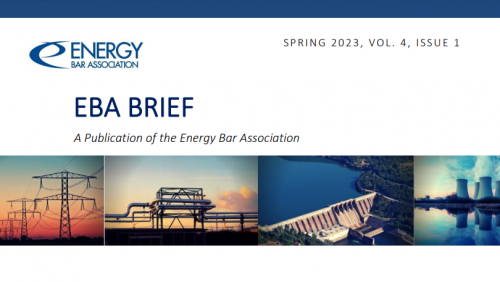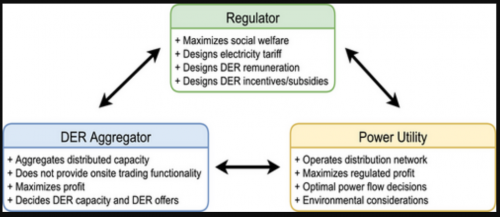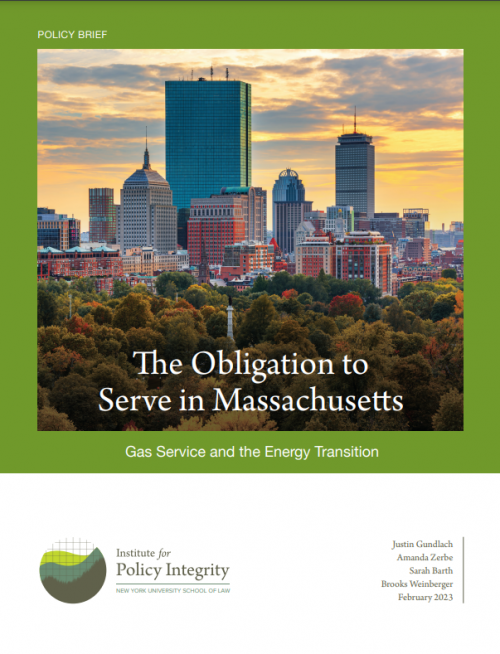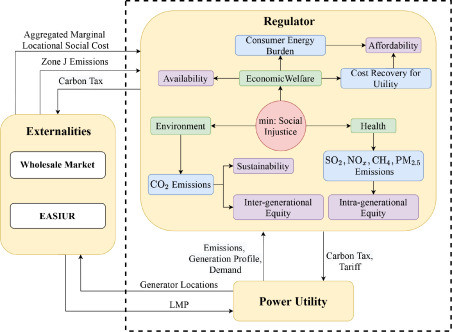-
Ünel Named to Advisory Council for New York Electric Grid Operator
The New York Independent System Operator (NYISO) has appointed Policy Integrity’s Executive Director, Dr. Burçin Ünel, to serve on its Environmental Advisory Council. The Council provides NYISO with information, analysis, and expert perspectives on state and federal environmental policies to help it better achieve its mission of maintaining reliability of the bulk electric system and administering competitive wholesale electricity markets. In her role on the Council, Dr. Ünel will use her expertise in utility regulation and energy policy to help NYISO build and maintain New York's “grid of the future.”
-
Comments to the New York Public Service Commission on Medium- and Heavy-Duty Electric Vehicle Charging
Together with Resources for the Future, we submitted comments to the New York Public Service Commission in response to questions posed by the Commission about addressing barriers to medium- and heavy-duty electric vehicle charging. Our comments focus on the possibility for managed charging to reduce infrastructure needs and on additional considerations to optimize emissions outcomes. Our comments are centered around depot charging and draw on research that examines fleet charging needs in a depot setting.
-

The Impact of West Virginia v. EPA on Challenges to FERC’s Authority Under the Major Questions Doctrine
Published in Energy Bar Association Brief
The Supreme Court’s recent applications of the major questions doctrine have prompted numerous challenges to pending or proposed regulatory actions, including the Federal Energy Regulatory Commission’s (FERC’s) proposed revisions to Order No. 1000’s regional transmission-planning and cost-allocation rules (Transmission Rulemaking) and updated draft policy statements on certification of new interstate natural gas facilities (Draft Policy Statements). This article addresses the impact of West Virginia v. EPA—the most recent Supreme Court case involving the major questions doctrine—on FERC’s regulatory authority.
-
Comments to NY Public Service Commission on Energy Storage Roadmap
We submitted recommendations to the New York Public Service Commission regarding New York’s 6 GW Energy Storage Roadmap: Policy Options for Continued Growth in Energy Storage, a document that analyzes the need to increase New York’s storage target to 6 GW and the barriers to storage deployment, and provides policy recommendations to help the state achieve 6GW of storage deployment by 2030.
-

Value of Distribution System Information for DER Deployment
Integration of Distributed Energy Resources (DERs) in power systems exacerbates the existing information problems between power utilities and regulators. DER policies oblivious to the trilemma of information asymmetry between power utilities, DER aggregators, and regulators result in distorted price signals to DER investors, and socially inefficient DER roll-out. Therefore, in this paper, a game-theoretic approach is proposed for modeling information asymmetry in distribution network information and consumer data between the DER aggregators and the power utilities.
-

The Obligation to Serve in Massachusetts
Gas Service and the Energy Transition
In Massachusetts, achieving the state’s decarbonization target in a cost-effective manner will likely require the refusal of new gas service in addition to the termination of existing gas service in certain buildings and its replacement with electric service. The scope of utilities’ legal obligation to serve their customers will be central to those efforts. This brief analyzes the contours of this obligation by examining the relevant Massachusetts statutes, regulations, Public Utility Commission decisions, and case law.
-

Electricity Tariff Design via Lens of Energy Justice
Distributed Energy Resources (DERs) can significantly affect the net social benefit in power systems, raising concerns pertaining to distributional justice and equity. Current tariff design approaches suffer from opaque efficiency-equity trade-offs and are also agnostic of the externalities that affect both economic efficiency and equity. Therefore, this paper develops a justice-cognizant tariff design framework that improves the operational savings in the system without sacrificing distributional equity, and encompasses economic welfare, social costs of environmental and public health impacts, and socio-economic and demographic characteristics of electricity consumers. We evaluate four different tariff structures using a Multi-Objective Problem with Equilibrium Constraints. We then compare the operational savings and equity of the proposed framework using the 11-zone New York ISO and 7-bus Manhattan power networks. The results demonstrate that justice-cognizant, and spatially- and temporally-granular tariffs ensure equity and increase the operational savings at a lower energy burden to consumers.
-
Shaping Connecticut’s Energy Storage Strategy
Energy storage can play an important role in a transition to clean energy, but only if it’s deployed within an effective policy framework. The Connecticut Public Utility Regulatory Authority (PURA) adopted our recommendations to target its energy storage incentives to areas with the highest differential between the highest and lowest marginal emissions rates so batteries could ultimately lead to reductions in emissions. In addition, PURA directed the Connecticut Green Bank to review our comments when setting the scope of the program's marketing plan.
-
Comments to PUCT on Wholesale Electricity Market Design
The Texas Public Utility Commission (PUCT) requested public input as part of an ongoing effort to ensure the reliability of its wholesale electricity market design following Winter Storm Uri. We submitted comments on how the PUCT can achieve its reliability goals in a manner that ensures just and reasonable rates for consumers. For any new mechanism it may deem necessary, we encouraged the PUCT to choose a design that accords with economic principles. Such a design would compensate both dispatchable and non-dispatchable resources according to their reliability value, include an efficient penalty structure for non-performance of generation units, reduce uncertainty for market participants, and mitigate market power exercise.
-
Policy Brief and Supplemental Comments on the FERC Transmission Planning Rule and the Major Questions Doctrine
Together with Harvard’s Electricity Law Initiative, we prepared a policy brief and supplemental comments defending the Federal Energy Regulatory Commission’s (FERC) proposed rule on transmission planning reform from arguments that the proposal would trigger the major questions doctrine. We review previous transmission planning regulations and orders by FERC to explain that the major questions doctrine does not apply because the proposed rule is neither unheralded nor transformative.
Viewing recent projects in Electricity







